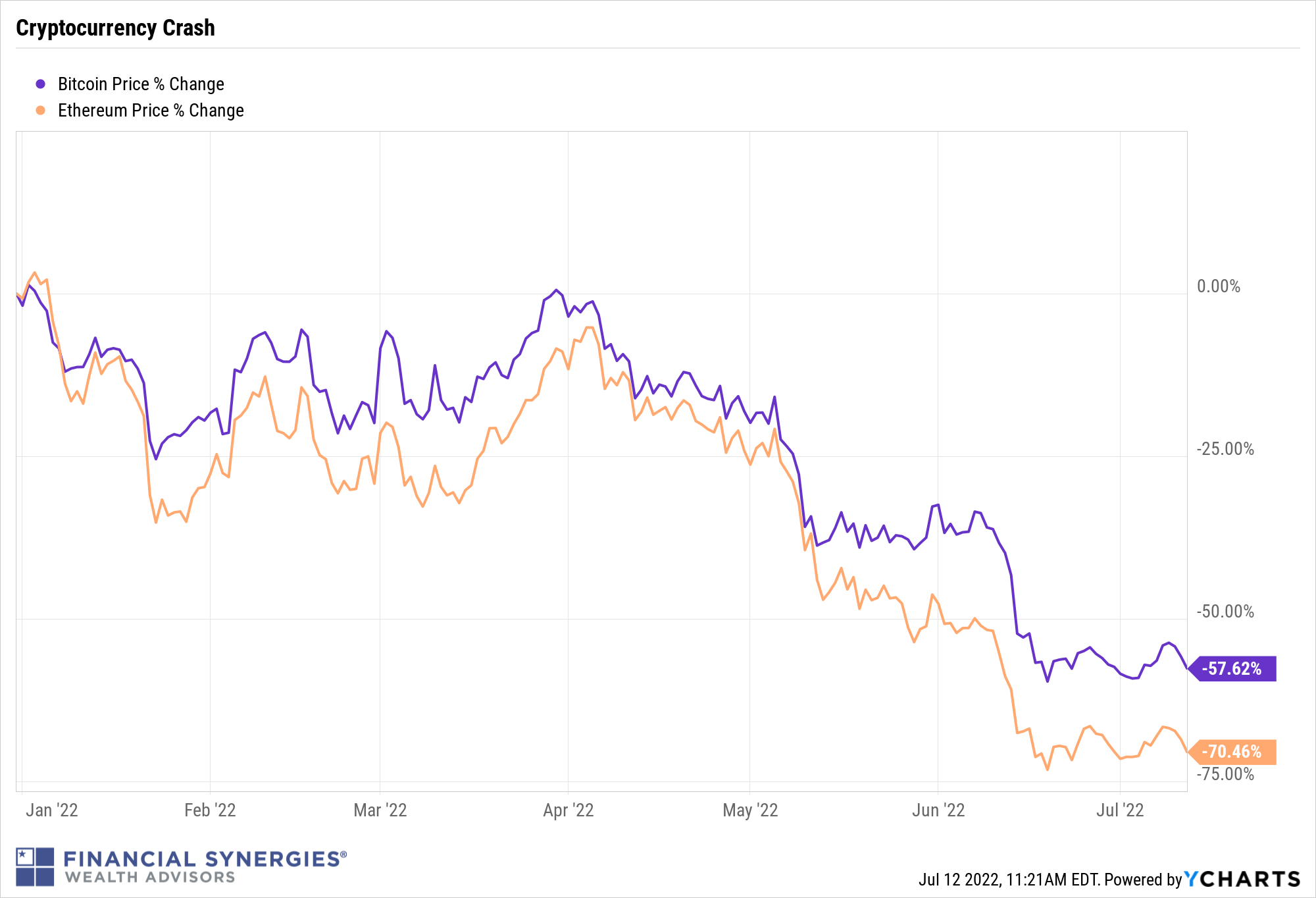[ad_1]
It’s been a bad year for just about every investable asset class on the planet. But, it’s been particularly bad for cryptocurrencies. Two of the more well-known digital coins, Bitcoin and Ethereum, are down -58% and -70% year-to-date. The fall has been nothing short of breathtaking.

Investors in digital currencies have gotten crushed and the news is going from bad to worse. You can hardly tune into the financial news media without the mention of cryptocurrency brokers and hedge funds filing for bankruptcy, or crypto lenders locking up investor funds.
The “Crypto Winter” is here.
I don’t think digital currency is going away, and certainly not the blockchain technology behind it. But I think it’s fair to assess that, thus far, cryptocurrency:
- Has not been a good diversifier away from stocks
- Has not been a good “store of value”
- Has not been a widely accepted form of payment (at least not yet)
- Has not been a good inflation hedge
Now, all that being said, cryptocurrency is still in its infancy. This asset class has experienced many extreme ups and downs over the last decade. What makes this time a little different is that WAY more people are invested in the coins than were even just five years ago.
Crypto is down, but not out, in my opinion.
Now, let’s take a look at some of the other reasons you may want to tread lightly with cryptocurrency investments.
We’ll start with the basics…
Between the stories we see on the internet, the countless memes, and the growing library of buzzwords, it’s hard to research today’s economy without running into some references to cryptocurrency. According to the FTC, cryptocurrency is a type of digital currency that exists electronically. You can use crypto like the way you use cash. You can invest in it, use it to buy things, and keep it in your (digital) wallet.
But as with any investment or currency, there are a few pitfalls to consider before jumping headlong into the world of crypto. Here, we outline some of the most significant drawbacks to consider as you research crypto.
1. Lofty Promises
It’s difficult to find an article about cryptocurrency that doesn’t contain some hyperbolic claims about the currency’s performance. An article from Bloomberg shares some tweets from bitcoin fans that say crypto will be the world’s biggest benefactor, is the “only monetary asset ever, has saved lives, and may one day hit $100,000 or even $1M a share.”
To an uneducated investor, all of these claims might sound like magic. But, as with any asset, it’s important to remember that we can’t see into the future, and we have no idea how it will perform in the coming years. Approach these claims as hesitantly as you would those regarding any other asset.
2. Crypto Isn’t FDIC-Insured
Cryptocurrency accounts aren’t backed by the government like traditional bank accounts. There are some third-party companies where you can store your digital wallets, but if something happens to those companies, the government has no obligation to step in and help get your money back.
In addition to not being backed by government protection, most cryptocurrency payments don’t come with legal protections like credit or debit card purchases do. If you need to dispute a purchase you made using crypto, the process could be long and complicated, if not impossible. In addition, most purchases using crypto aren’t reversible. This lack of purchase protection and insurance could be a deal-breaker to some.
3. Crypto May Be Less Secure
Because your currency is stored online, crypto comes with some inherent security risks, both on-and off-line. For example, there’s always the risk of cybersecurity breaches, hacking, fraud/market manipulations, and other technological risks.
Just as important, there are also human error risks that one should consider before purchasing crypto. What would happen if you forgot your password or someone stole your laptop? How would you access your digital wallet? The New York Times famously covered the story of Stefan Thomas, a German-born programmer who had two attempts remaining to guess the password to his digital wallet worth $220 million at the time of writing. Cryptocurrency and digital wallets give a new meaning and horror to the prompt “Forgot your password?”
4. Crypto Still Has to Prove Its Case
Lastly, cryptocurrency is still relatively new and needs more time to prove its case. You can buy more things with crypto now than you could in past years, but you certainly can’t buy everything with crypto. In March 2021, Elon Musk said that Tesla would accept Bitcoin as payment but later stated that the company would no longer accept Bitcoin, due to its environmental impact. This is just one example of the instability of using crypto as a payment method.
Cryptocurrency is a major player in today’s economy, but it’s worth taking time to consider its drawbacks before jumping in too deep.
Sources:
- https://www.bloomberg.com/news/articles/2022-03-08/bitcoin-bros-turn-hyperbolic-as-slump-from-highs-dents-appeal
[ad_2]
Source links Google News

